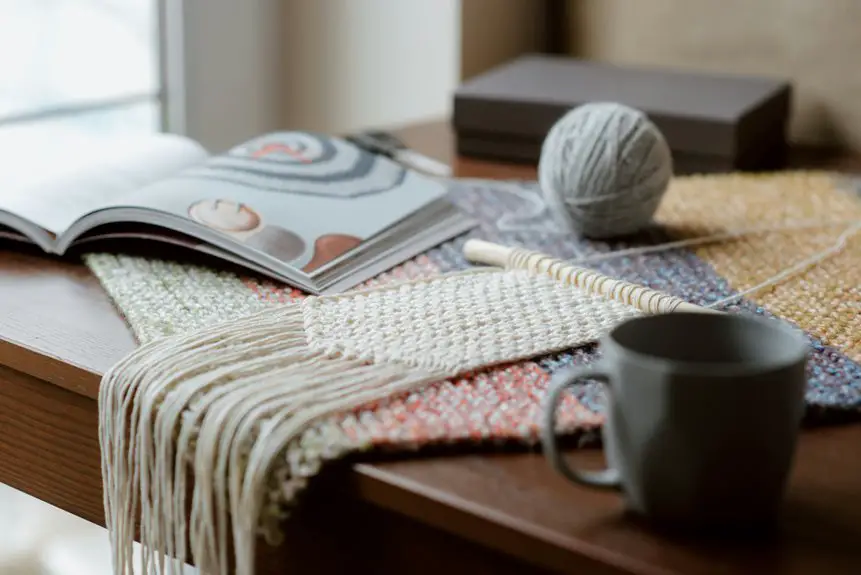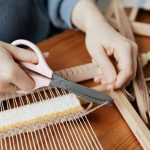You’ll appreciate abaca fiber for eco-friendly tea bags because it’s incredibly strong, tear-resistant, and naturally biodegradable, making it perfect for brewing without plastic waste. It breaks down safely, protecting the environment and reducing microplastic pollution. Plus, its cultivation supports sustainable farming and boosts rural livelihoods. While processing has some challenges, abaca’s benefits shine through in durability and eco-conscious appeal. Keep exploring to uncover how this fiber revolutionizes tea packaging and supports communities.
Table of Contents
Key Takeaways
- Abaca fiber is biodegradable and compostable, ensuring eco-friendly disposal without harmful residues.
- Its exceptional strength and tear resistance prevent tea bags from falling apart during brewing.
- Harvested sustainably from renewable plants, abaca reduces reliance on synthetic, plastic-lined tea bags.
- Abaca fiber cultivation supports rural livelihoods and promotes sustainable agricultural practices.
- Using abaca tea bags significantly reduces plastic waste and microplastic pollution in the environment.
The Origin and Harvesting of Abaca Fiber
Although you mightn’t realize it, abaca fiber comes from a unique plant native to the Philippines. When you think of harvesting, imagine carefully stripping the outer layers of the abaca stalks to reveal long, strong fibers inside.
Farmers typically harvest abaca plants every few months, ensuring a steady supply without damaging the plant’s growth cycle. After harvesting, you’ll see the fibers dried under the sun or mechanically processed to maintain their strength and flexibility.
These fibers are naturally resistant to saltwater, making them ideal for a variety of uses, including eco-friendly tea bags. The entire process respects traditional methods while integrating modern techniques to optimize quality and sustainability.
Environmental Benefits of Using Abaca Fiber
When you choose abaca fiber for tea bags, you’re supporting a material that naturally breaks down without harming the environment.
This fiber comes from a renewable resource, meaning you’re helping reduce reliance on synthetic materials that linger in landfills for years.
Abaca fiber is biodegradable and compostable, so it won’t contribute to microplastic pollution in your tea cup or the ecosystem.
Abaca fiber breaks down naturally, preventing microplastic pollution in your tea and the environment.
Plus, its cultivation often encourages sustainable farming practices, preserving soil health and biodiversity.
Here’s why abaca fiber benefits the environment:
- Derived from a fast-growing, renewable plant resource
- Fully biodegradable and compostable, minimizing waste
- Reduces microplastic pollution compared to synthetic fibers
- Supports sustainable farming and biodiversity conservation
Choosing abaca fiber means you’re making a cleaner, greener choice for your tea ritual.
Strength and Durability of Abaca Fiber Tea Bags
You’ll appreciate how abaca fiber’s natural strength makes tea bags tough and long-lasting.
Its tear-resistant properties mean the bags hold up well during brewing without falling apart.
Let’s explore why this durability matters for both you and the environment.
Natural Fiber Strength
Abaca fiber boasts exceptional strength that sets it apart from other natural materials used in tea bags. When you choose abaca, you’re getting a fiber that holds up under hot water without breaking down, ensuring your tea stays pure and flavorful.
Its natural robustness means you won’t have to worry about your tea bag falling apart during steeping. Plus, abaca’s strength supports eco-friendly production by reducing waste.
Here’s what makes abaca fiber strong for tea bags:
- High tensile strength resists stretching and deformation
- Fibrous structure maintains integrity in hot water
- Durable enough for multiple uses without losing form
- Naturally resilient, reducing the need for synthetic additives
Using abaca fiber means you get a reliable, sustainable tea bag every time.
Tear-Resistant Properties
The impressive strength of abaca fiber naturally contributes to its tear-resistant qualities, making it an ideal choice for tea bags that withstand handling and steeping.
When you use abaca fiber tea bags, you won’t have to worry about them ripping or falling apart as you dunk them in hot water. This durability guarantees your tea stays contained, preventing messes and wasted leaves.
Unlike traditional paper or synthetic bags, abaca fibers hold up well under moisture and heat, giving you a reliable brewing experience every time.
You’ll appreciate how these tea bags maintain their integrity, even during vigorous stirring or long steeping periods.
Choosing abaca fiber means you get a sturdy, eco-friendly option that performs without compromise.
Biodegradability and Compostability Explained
Although many materials claim to be eco-friendly, understanding biodegradability and compostability helps you make better choices for the environment.
Biodegradability means a material breaks down naturally by microorganisms, leaving no harmful residue. Compostability goes a step further—materials decompose into nutrient-rich compost within a specific time frame under the right conditions.
When you choose tea bags made from abaca fiber, you’re opting for a product that’s both biodegradable and compostable, reducing landfill waste and supporting soil health.
Key points to remember:
- Biodegradable materials break down naturally without pollution.
- Compostable items decompose into beneficial compost.
- Time and conditions affect how materials break down.
- Abaca fiber meets standards for both biodegradability and compostability.
This knowledge lets you support truly sustainable tea bags.
How Abaca Fiber Enhances Tea Brewing Quality
Choosing tea bags made from eco-friendly materials like abaca fiber not only benefits the environment but also improves your tea brewing experience.
Abaca fiber’s natural strength and porous texture allow hot water to flow freely through the tea leaves, ensuring ideal extraction of flavors and aromas. You’ll notice a richer, more vibrant taste because the fiber doesn’t interfere with the infusion process.
Abaca fiber’s porous texture lets water flow freely, unlocking richer flavors and vibrant aromas in every cup.
Plus, abaca resists tearing, so you won’t have to worry about bits of the bag breaking off into your cup. Its breathable nature also prevents clumping, allowing your tea leaves to expand fully and release their full potential.
When you use abaca fiber tea bags, you get a cleaner, smoother brew that highlights the true character of your tea.
Comparison With Traditional Tea Bag Materials
When you compare abaca fiber to traditional tea bag materials like paper or nylon, the differences become clear.
Abaca offers natural strength and biodegradability that synthetic fibers lack. Unlike nylon, it doesn’t release microplastics into your cup or environment.
Compared to paper, abaca’s durability means it won’t tear easily during brewing, giving you a cleaner experience. Plus, abaca fibers are naturally porous, allowing better water flow and flavor extraction.
- Biodegradable and compostable, unlike nylon
- Stronger and more durable than paper
- Doesn’t shed microplastics or chemicals
- Enhances water flow for richer taste
Choosing abaca fiber means you get a practical, eco-friendly alternative that respects both your tea and the planet.
Impact on Reducing Plastic Waste in Tea Industry
Since plastic waste from tea bags contributes considerably to environmental pollution, switching to abaca fiber can make a real difference.
When you choose tea bags made from abaca, you’re opting for a biodegradable alternative that breaks down naturally, unlike plastic-lined bags that linger in landfills and oceans. This shift helps cut down the billions of plastic tea bags discarded yearly.
You reduce microplastic contamination, protecting marine life and soil health. Plus, abaca’s durability means tea bags maintain their shape without synthetic additives, so you avoid hidden plastics altogether.
Supporting Local Communities Through Abaca Cultivation
When you choose abaca fiber for tea bags, you help boost the income of local farmers and strengthen rural communities.
Abaca cultivation empowers these farmers by providing stable jobs and encouraging sustainable farming methods.
This support promotes both economic growth and environmental care in the regions where abaca thrives.
Economic Benefits for Farmers
Although abaca cultivation requires dedication, it offers farmers a reliable source of income that directly supports their families and communities.
When you invest time in growing abaca, you tap into a steady market demand driven by eco-friendly products like tea bags. This consistent need helps stabilize your earnings throughout the year, reducing financial uncertainty.
Plus, abaca farming often involves local cooperatives, which can boost your negotiating power and access to resources.
Here’s how abaca cultivation economically benefits you:
- Guarantees steady income due to growing demand for sustainable fibers
- Opens opportunities for cooperative-based profit sharing
- Reduces dependency on volatile cash crops
- Encourages reinvestment in local infrastructure and services
Empowering Rural Livelihoods
By choosing to cultivate abaca, you play an essential role in strengthening rural communities and improving local livelihoods. Your work supports families who depend on abaca farming as their primary income, helping them achieve financial stability.
As abaca cultivation grows, you help create jobs beyond farming—like processing and weaving—boosting the local economy. This ripple effect means schools, healthcare, and infrastructure in rural areas can flourish.
When you invest in abaca, you empower smallholder farmers and their communities to build a better future. Your commitment to abaca cultivation doesn’t just produce eco-friendly fibers; it nurtures social progress and uplifts generations.
Supporting abaca means you’re part of a movement that values both the environment and people’s well-being.
Promoting Sustainable Agriculture
Since abaca cultivation relies heavily on natural farming methods, you help promote sustainable agriculture that preserves soil health and biodiversity.
By choosing abaca fiber, you support farmers who use organic techniques, avoid harmful chemicals, and maintain the land’s fertility. This approach benefits local ecosystems and guarantees long-term productivity. Supporting abaca cultivation means you’re also empowering communities to practice responsible farming.
Here’s how abaca cultivation promotes sustainability:
- Utilizes organic fertilizers and natural pest control
- Prevents soil erosion through ground cover
- Encourages crop diversity alongside abaca plants
- Reduces reliance on synthetic chemicals and promotes healthy ecosystems
Challenges in Manufacturing Abaca Fiber Tea Bags
When you start working with abaca fiber for tea bags, you quickly realize it demands specialized handling due to its unique texture and strength. You must adapt machinery and processes to accommodate its coarse, fibrous nature, which can clog or damage standard equipment. Quality control also becomes critical, as inconsistent fiber thickness affects bag durability and steeping performance. Additionally, sourcing sustainable abaca fiber in sufficient quantities presents logistical challenges.
| Challenge | Impact | Solution |
|---|---|---|
| Fiber Coarseness | Machine clogging | Customized equipment |
| Variable Thickness | Uneven bag strength | Strict quality control |
| Limited Supply | Production delays | Partner with local farmers |
| Processing Speed | Reduced output | Process optimization |
| Cost | Higher production expenses | Scale economies |
Future Trends in Sustainable Tea Packaging
You’re likely noticing a rise in biodegradable packaging options that reduce environmental impact.
As consumer demand shifts toward sustainability, brands are innovating with materials like abaca fiber.
Let’s explore how these trends are shaping the future of tea packaging.
Biodegradable Packaging Innovations
Although many tea brands have embraced eco-friendly materials, you’ll find that biodegradable packaging innovations are rapidly evolving to meet growing environmental demands.
You can now choose packaging that breaks down quickly without harming ecosystems, making your tea experience truly sustainable. Innovations focus on materials that offer durability during transport yet decompose easily after use.
You’ll notice options like:
- Plant-based films derived from cellulose or starch
- Compostable inks and adhesives that leave no toxins
- Edible packaging components reducing waste further
- Advanced coatings that maintain freshness without plastic
Consumer Demand Shifts
As consumers grow more eco-conscious, their expectations for sustainable tea packaging are shifting rapidly. You’re looking for products that not only taste great but also align with your values—minimal environmental impact and clear transparency.
You want packaging that’s biodegradable, compostable, and made from renewable resources like abaca fiber. Brands are responding by ditching plastics and embracing natural fibers that break down quickly without leaving harmful residues.
You also expect innovations that reduce waste, such as reusable or refillable options. As your demand grows, companies invest more in sustainable materials and ethical sourcing.
Choosing abaca fiber tea bags means you support a future where tea enjoyment and environmental responsibility go hand in hand, reflecting your commitment to conscious consumption and a healthier planet.
Frequently Asked Questions
How Does the Cost of Abaca Fiber Tea Bags Compare to Regular Ones?
You’ll find abaca fiber tea bags usually cost a bit more than regular ones because of sustainable sourcing and durability. However, you’re paying for eco-friendliness and quality, which many consider worth the extra expense.
Are Abaca Fiber Tea Bags Safe for People With Allergies?
You might worry about allergies, but abaca fiber tea bags are generally safe. Since they’re natural and hypoallergenic, you won’t face common irritants. Still, if you have specific sensitivities, it’s wise to test first or consult a doctor.
Can Abaca Fiber Tea Bags Be Used for All Types of Tea?
You can use abaca fiber tea bags for all tea types since they’re durable and breathable. They won’t affect flavor, making them ideal for black, green, herbal, or any tea you prefer steeping.
How Should Abaca Fiber Tea Bags Be Stored to Maintain Freshness?
Want your tea bags to stay fresh longer? You should store them in a cool, dry place away from sunlight and moisture. Airtight containers work best to keep flavors intact and prevent any unwanted odors.
Do Abaca Fiber Tea Bags Affect the Flavor of Herbal Teas Differently?
You won’t notice abaca fiber tea bags altering your herbal tea’s flavor since they’re naturally neutral. They preserve the tea’s true taste while being eco-friendly, so your brew stays fresh and authentic every time.
- Why Abaca Fiber Is the Perfect Material for Eco-Friendly Tea Bags - June 25, 2025
- 21 Incredible Uses for Abaca Fiber You Didn’t Know About - June 25, 2025
- What Is an Abaca Fiber Dryer and Why Is It Crucial for Quality? - June 25, 2025







